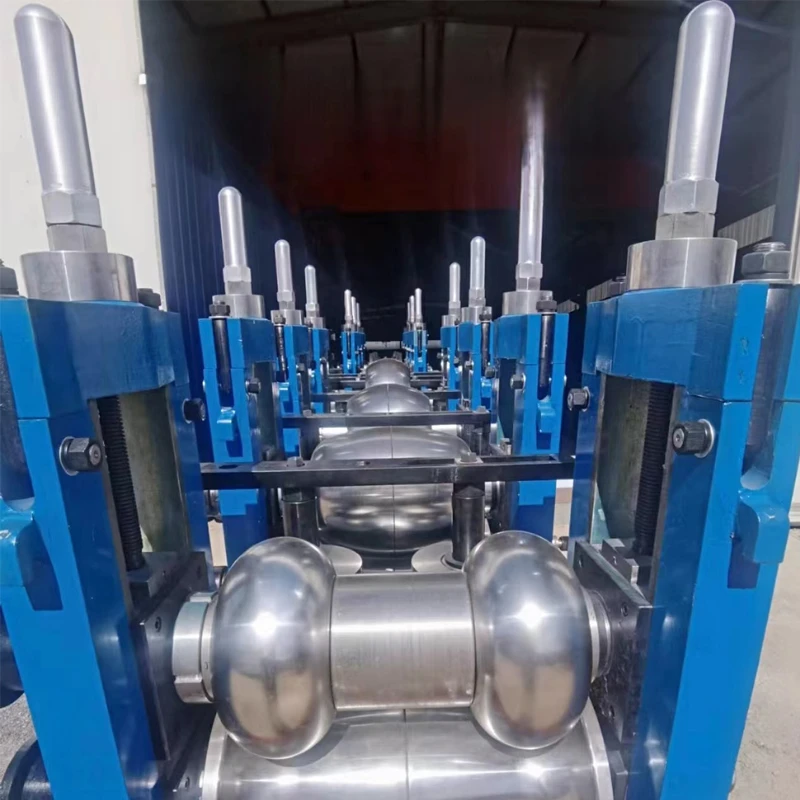Innovative Techniques in Roll Forming Tube Mill Design and Efficiency Optimization
Roll Forming Tube Mill An Overview
Roll forming tube mills are advanced manufacturing systems designed for the production of various tubular products. This process is prominently utilized in the fabrication of steel tubes and pipes, which serve a myriad of applications across diverse industries. The efficiency and versatility of these mills have made them indispensable in modern manufacturing practices.
At the core of a roll forming tube mill is the continuous bending of a flat strip of metal into a tubular shape. The process begins with feeding a flat metal strip, often referred to as a coil, into a series of precisely arranged rollers. As the coil progresses through each station of the mill, the rollers gradually shape the strip into a cylindrical form. The design of the rollers and their arrangement is critical, as it ensures the uniformity and accuracy of the final product.
One of the significant advantages of using roll forming tube mills is their ability to produce long lengths of tubing with consistent cross-sectional shapes. This characteristic is particularly advantageous for applications requiring extended lengths, such as structural components in buildings or supports in construction projects. Additionally, the continuous nature of the process allows for high-speed production, significantly increasing output compared to traditional methods.
The materials used in roll forming tube mills are typically steel, aluminum, and other metals. These materials can be further processed to have different finishes and coatings, enhancing their durability and resistance to environmental factors. For instance, galvanized steel tubes are commonly produced to prevent rusting, making them suitable for outdoor usage.
roll forming tube mill

Moreover, the customization possibilities with roll forming tube mills are vast. Manufacturers can tailor the dimensions, wall thickness, and shapes of the tubes according to specific requirements. This adaptability enables manufacturers to cater to niche markets, providing products that meet exact engineering specifications.
Another critical aspect of roll forming tube mills is quality control. Advanced technologies integrated into these mills, such as laser measurement systems and computer numerical control (CNC), enhance the precision of the manufacturing process. Continuous monitoring and adjustments can be made to ensure that the final products meet stringent quality standards. This focus on quality not only minimizes waste but also builds trust with clients, contributing to long-term business relationships.
In the context of sustainability, roll forming tube mills are also paving the way for environmentally friendly manufacturing practices. The process generates minimal waste material, and the recyclability of metals used reduces the overall environmental impact. Manufacturers are increasingly focusing on sustainable production methods, aligning with global trends toward greener manufacturing.
In conclusion, roll forming tube mills represent a sophisticated and efficient technology for producing high-quality tubular products. With the ability to work with various materials, deliver customized solutions, and maintain stringent quality control measures, these mills play a vital role in supporting numerous industries, including construction, automotive, and infrastructure. As technology advances, we can expect further innovations in roll forming processes, resulting in even more efficient and environmentally responsible manufacturing solutions. This commitment to efficiency and quality positions roll forming tube mills as a cornerstone of modern industrial operations.
-
High Frequency Straight Seam Welded Pipe Production Line-BzZhou Xinghua Machinery Equipment Manufacturing Co., LTD.|Precision Welding, High EfficiencyNewsJul.30,2025
-
High Frequency Straight Seam Welded Pipe Production Line|BzZhou Xinghua|Precision Welding&EfficiencyNewsJul.30,2025
-
High Frequency Straight Seam Welded Pipe Production Line - BzZhou Xinghua|Precision Engineering&EfficiencyNewsJul.30,2025
-
High-Frequency Straight Seam Welded Pipe Production Line-BzZhou Xinghua Machinery Equipment Manufacturing Co., LTD.NewsJul.30,2025
-
High-Frequency Straight Seam Welded Pipe Production Line-BzZhou Xinghua Machinery Equipment Manufacturing Co., LTD.|Precision Manufacturing, High EfficiencyNewsJul.30,2025
-
High Frequency Straight Seam Welded Pipe Production Line-BzZhou Xinghua Machinery Equipment Manufacturing Co., LTD.|Precision Steel Pipe Manufacturing&Industrial EfficiencyNewsJul.29,2025


